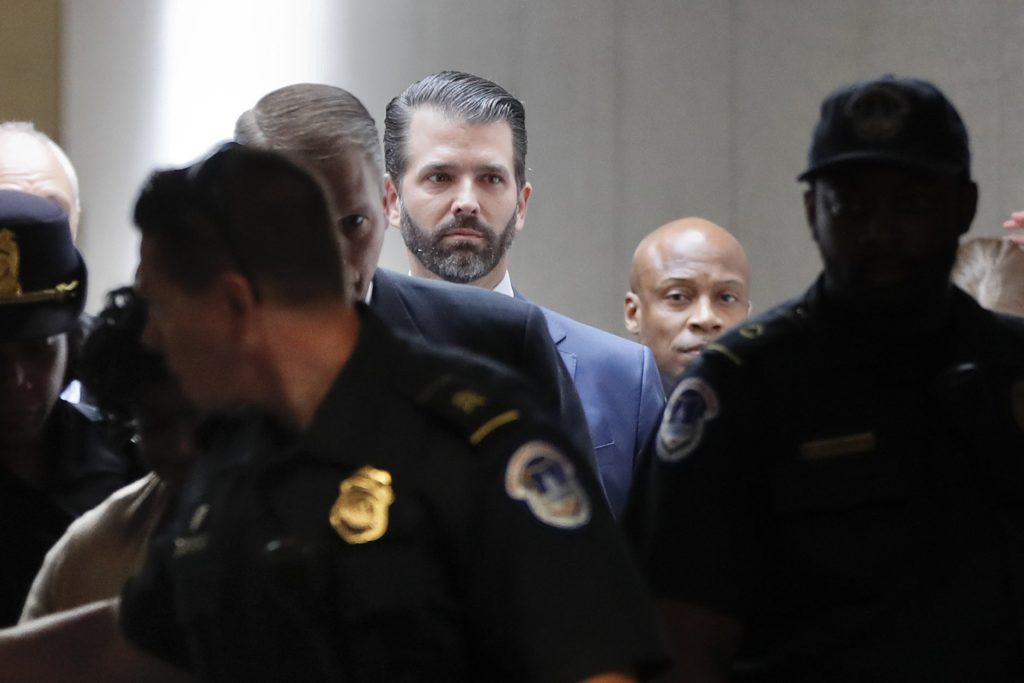House Democrats angling to spotlight damning allegations from special counsel Robert Mueller’s report are focusing Wednesday on contacts between the Trump 2016 presidential campaign and Russia.
The House Intelligence Committee has invited two former FBI senior officials to testify about the counterintelligence implications of Mueller’s investigation. Mueller did not find a criminal conspiracy between the campaign and Russia but did detail a series of interactions and outreach that have alarmed Democrats and accelerated calls from some in the party for impeachment proceedings and renewed investigations.
The report details more than 100 contacts between Russia and Trump associates, some in public and others in private, said Rep. Adam Schiff, the Democratic committee chairman. Among them was a June 2016 meeting at which the president’s oldest son, Donald Trump Jr., expected to receive dirt from Russia about his father’s Democratic opponent, Hillary Clinton.
Also Wednesday, Trump Jr. was scheduled to testify behind closed doors before the Senate Intelligence Committee , according to two people familiar with the meeting. Senators want to discuss answers he gave the panel’s staff in a 2017 interview and to another Senate panel in a separate interview that year.
President Donald Trump’s former lawyer Michael Cohen told a House committee in February that he had briefed Trump Jr. approximately 10 times about a plan to build a Trump Tower in Moscow before the presidential election. Trump Jr. told the Judiciary panel he was only “peripherally aware” of the real estate proposal.
In the House hearing, both ex-FBI officials, Robert Anderson and Stephanie Douglas, retired from the bureau before it launched its investigation into the Trump campaign in summer 2016. By inviting them instead of agents involved in the investigation, Democrats are giving center stage to longtime career officials likely to be seen as more neutral and devoid of the political baggage that accompanies some of the Republican president’s more outspoken critics, including former FBI deputy director Andrew McCabe and former agent Peter Strzok. Both were fired last year.
“The primary objective of a counterintelligence investigation is not to target an individual for prosecution but to protect the nation by developing information about the actions and intentions of foreign powers and to thwart them before they can act against us,” Schiff said at the hearing.
It was unclear whether Republicans would seek to undermine the credibility of the witnesses at the hearing or merely try to minimize their testimony by noting that they weren’t part of the investigation.
The hearing comes two days after the House Judiciary Committee heard from John Dean , the former White House counsel in the Nixon administration, who described how the Watergate investigation could function as a roadmap for probes into the current president.
It also comes as House Speaker Nancy Pelosi has brushed back calls for impeachment, saying Tuesday that “it’s not even close” to having enough support.
The House voted 229-191 Tuesday to approve a sweeping resolution that will allow Democrats to accelerate their legal battles with the Trump administration. They’re preparing Wednesday to hold more Trump officials in contempt for defying congressional subpoenas.
“We need answers to the questions left unanswered by the Mueller report,” Pelosi said on the House floor ahead of the vote.
House Minority Leader Kevin McCarthy countered that the Democratic maneuvers are all “just a desperate attempt to re-litigate the Mueller investigation.”
Said McCarthy, “It’s an impeachment effort in everything but name.”
Earlier in the day Pelosi all but ignored questions about impeachment during a policy conference, saying the Democrats’ strategy is “legislating, investigating, litigating” — in that order.
Pressed about Trump, she said: “I’m done with him. I don’t even want to talk about him.”
The far-reaching House resolution approved Tuesday empowers committee chairs to sue top Trump administration officials — Attorney General William Barr, former White House Counsel Don McGahn and others — to force compliance with congressional subpoenas, including those for Mueller’s full report and his underlying evidence.
The move makes it easier to sue Trump administration officials and potential witnesses by empowering committee chairmen to take legal action without a vote of the full House, as long as they have approval from a bipartisan group of House leaders.
The Judiciary Committee Chairman, Rep. Jerrold Nadler of New York, urged his colleagues to support the legislation “so we can get into court and break the stonewall without delay.”
It’s unclear how quickly Democrats will go to court. House leaders signaled they will hold off on suing Barr after the panel struck a deal with the Justice Department to receive some underlying materials from Mueller’s report.
A court case could come more quickly for McGahn, who has defied subpoenas for documents and testimony at the behest of the White House.
McGahn is in “a particularly vulnerable situation” as a private person no longer employed by the government, said Rep. Hakeem Jefferies, D-N.Y., a member of the leadership team. “He should begin to cooperate immediately or face the consequences.”
In an evolving legal strategy, Democrats have moved toward lawsuits and away from criminal contempt as they investigate the Trump administration. Criminal contempt would be referred to the Justice Department, where it would certainly be rejected. In the courts, meanwhile, Democrats have scored some early wins over Trump.
Easing tensions with Barr, at least for now, Nadler said the panel will not vote to hold the attorney general in criminal contempt. But with Tuesday’s vote to authorize civil legal action, Democrats made clear that they are still willing to go to court if necessary.
(AP)











